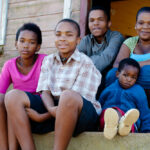
Power of Two Celebrates Relocation to Central Brownsville
May 24, 2021
Power of Two Stands in Solidarity with Haitian Refugees
September 23, 2021Ecological Predictors of Parental Beliefs about Infant Crying in a Randomized Clinical Trial of ABC

“Ecological Predictors of Parental Beliefs about Infant Crying in a Randomized Clinical Trial of ABC,” a research study supported by Power of Two and authored by lead researcher Daneele Thorpe, along with Jamilah Silver; Laura Perrone; Nicole DeSantis; Allison Dash; Melanie Rodriguez; Erasma Beras-Monticciolo; and Dr. Kristin Bernard, was published on May 26, 2021 in the “Journal of Clinical Child & Adolescent Psychology.”
The goals of the study were to examine the associations between microsystem factors—including family, peers and sociodemographic—and exosystem factors—such as community and neighborhoods—on how parents frame their beliefs about infant crying. The study also assessed the effectiveness of Attachment and Biobehavioral Catch-Up (ABC), an attachment-based intervention, in changing parents’ beliefs about infant crying and explored how both the microsystem factors and neighborhood crime affected ABC’s effectiveness.
Previous studies have found that several microsystem factors interfere with responsive parenting behaviors and are associated with decreased parental nurturance and involvement. Many of these microsystem factors increased burden and caused psychological distress in parents that limited sensitive caregiving. Further, greater psychological distress and depressive symptomatology were associated with more negative parenting behaviors such as intrusive and controlling behaviors, negative expressions, and aggressive and punishing behaviors.
Other studies have found that parents who express more maladaptive parent-centered beliefs about infant crying tend to respond less promptly and sensitively to their infants than parents who express more infant-centered beliefs. In a diverse sample of parents, greater maladaptive beliefs predicted lower responsiveness to infant distress, suggesting that more maladaptive beliefs about infant crying are associated with decreased behavioral responsiveness to the needs of their infants.
Attachment theory suggests that parent responsiveness to infant distress predicts secure parent–child attachment and subsequent healthy child development. Specifically, increased maternal responsiveness to infant distress is associated with greater social competence, adaptive emotional regulation, and reduced behavioral problems in children. Parenting interventions such as ABC support parents to provide the care expected to facilitate secure attachment, positive socioemotional development, and positive child development.
While much is known about how microsystem factors affect responsive caregiving, very little research exists that investigates how exosystem factors, such as neighborhood crime, affect parenting—especially during infancy and early childhood. This study addresses this research gap by examining the effect of neighborhood crime on caregivers’ parenting beliefs during their child’s infanthood. This is the first study to not only investigate how exposure to neighborhood crime is associated with parent-centered beliefs versus infant-centered beliefs about infant crying but is also the first study to examine the extent to which ABC leads to improvements in parental beliefs about infant crying and distress.
The study observed a sample of 200 diverse caregivers and their 5 to 21 month-old infants, recruited by Power of Two between January 2016 and December 2017. It utilized data from a randomized clinical trial of ABC to assess whether microsystem factors such as single-parent status; low income; housing instability; young parenthood; parental psychopathology; and a parent’s own history of early adversity along with neighborhood crime density were associated with their beliefs about infant crying. Parents who confirmed their interest in the study were screened to determine their eligibility. Inclusion criteria included parents who were at least 16 years old and currently had custody of a child between 6 and 20 months of age. All study participants completed baseline assessments during a home visit, which included completion of questionnaires and a video-recorded parent–child interaction.
Parental beliefs about infant crying were measured using the Infant Crying Questionnaire (ICQ). To assess parent beliefs about infant crying, parents completed the questionnaire at the start of the program and at follow-up after completing the program. The questionnaire determines parental beliefs and categorizes those beliefs into two principal categories: (1) infant-centered beliefs that place priority on the infant’s needs and well-being such as “I want my child to be safe” and (2) parent-centered beliefs that place priority on the parent’s needs such as “I want my child to stop crying because it bothers me.”
The study determined that microsystem factors and increased crime density were significant predictors of more maladaptive, parent-centered beliefs about infant crying and, more significantly, that ABC positively impacted those beliefs. These results suggest that contextual factors outside the household are associated with and affect parenting beliefs and practices, and that participation in ABC was effective in reducing maladaptive beliefs. The findings of this study are consistent with previous research suggesting that community violence affects parenting beliefs and practices.
Given that parenting dynamics are affected by family-level, neighborhood-level and the community-level factors, investigating factors outside of the house along with those within the home may better inform approaches to child wellbeing. The study also has significant implications for legislative policy initiatives to promote positive child development and community healing.
About Daneele Thorpe, Lead Researcher
Daneele was born in Jamaica and migrated to Brooklyn, NY at age 10, where she attended elementary, middle, and high school. She attended college at Franklin and Marshall College in Lancaster, PA with the support of a full tuition scholarship from the Posse Foundation. In college, Daneele majored in Psychology and Public Health/Public Policy. She is currently in her fourth year of the clinical psychology doctoral program at Stony Brook University. Her current research focuses on factors at the family, neighborhood, and systemic levels that affect children.
